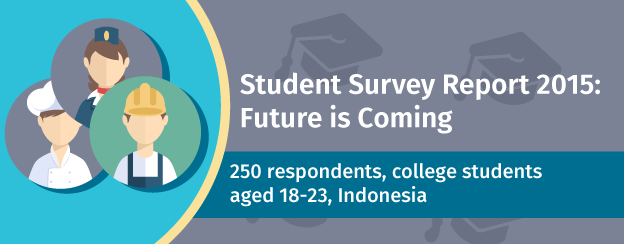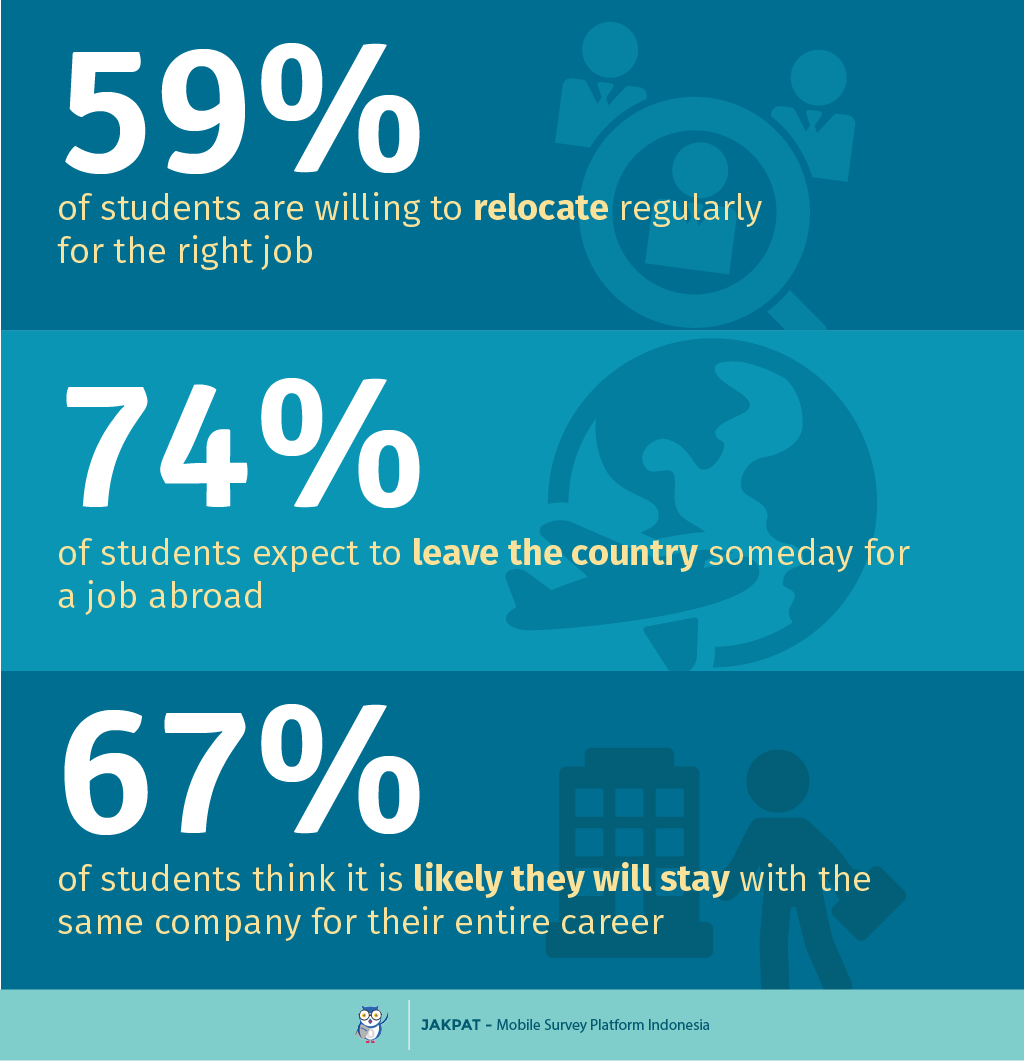A new semester of college has just begun in Indonesia. Universities are full of freshmen who had just finished their orientation, as well as sophomores, juniors, and seniors who had just come back from their holidays. Jakpat recently held a survey to see what those college students are thinking about the future they will face once they graduate. This survey involved 250 college students in Indonesia, particularly who study in the main island, Java, where most of top universities in this country are located. We would like to understand what drives career decisions amongst Indonesia’s graduate talent and how they see their upcoming future. Apparently, most of college students (85%) have already known what profession and which industry they want to work in once they graduate. Furthermore, 8 out of 10 students (82%) admit that they are currently taking their majors according to industry or profession they want to work in after graduating.
About industry, there are found top 4 of most desirable industries by Indonesian college students: finance and banking (29%), technology and automotive (28%), professional services (24%), education and research (17%). Technology and automotive sector is the most popular industry among male students (44%), with finance sector (26%) and professional service (22%) follow behind. Meanwhile, finance and banking sector is the top-of-mind industry for female students (33%), followed by professional services at second place (25%) and education at third (21%). Henceforth, when asked about which industry is likely to be most successful over the next 10 years, the top 4 students’ choices are: technology and automotive (44%), finance and banking (32%), professional services (26%), and tourism (23%). Again, male students are rooting for technology sector the most (51%), while surprisingly, female students are mostly divided into technology sector (38%) and finance sector (36%).
About the nation’s economic condition, 7 out of 10 students (75%) think that the economic instability will make it harder to find a job. As a developing country, Indonesia is still in a state of economic development, which resulting in the instability of the economic condition. Apparently some students are bothered by this situation, particularly when it comes to ‘find a job’ issues. Besides, Indonesia has been hit several times by financial crisis, which resulting in many people left jobless or got fired from their company. Consequently, it’s natural when most of the students (77%) feel worry about another financial crisis happening while they are in the workforce. They feel anxious whether the financial crisis would affect their career.
About the career decision, only more than half students (59%) are willing to relocate regularly for the right job. Simultaneously, also more than half students (67%) think that it is likely they will stay with the same company for their entire career. These are indicating that Indonesian students tend to look for stability when it comes to career decision. They are willing to regularly move from city to city as long as it is under the same company they’ve been working in. However, most of them (74%) admit that they expect to leave the country someday if they were offered for a job abroad. This still need another lookout about the reason why most of them want to work outside the country. Nevertheless, this indicates that many Indonesian students prefer working abroad to working in their own country.
About the future company, more than half students are stating that they want to work whether in a state-owned enterprise (59%) or a multi-national private company (53%). Concurrently, less popular choice is national private company (30%). Whereas, there are 2 out of 10 students (24%) who choose to be entrepreneurs rather than to work for a certain company in the future. Furthermore, when asked about their reasons in choosing a company, most of them (76%) say that career opportunity is the most important factor, while the other factors are salary offered (59%), working environment (52%), and professional challenges (34%).
Moreover about the company students want to work for in the future, approximately 67% of them want the company that provides opportunities for its employees to enhance their proficiency. Instead of only working and giving benefits for the company, they also would like to gain something in return from the company, not only in a form of salary, but also enhancement in their personal skills and abilities. About 70% of students also want the institution they work for in the future to contribute in making a better world. Simultaneously, almost all students (98%) want the work they do in the future to drive positive and sustainable change in society. At this point, it’s relevant with previous finding about what factor that determines students to choose their future company. They’re not merely thinking about salary offered, but also giving consideration more towards career opportunities and the company’s vision and mission.
Lastly, almost all students (98%) agree that having an extensive global network would help to build a good career. With the implementation of ASEAN Economic Community this year, Indonesian students not only get a chance to expand their opportunities, but also have to face a more advance challenge, since they will compete with not only among Indonesia’s graduate, but also all of ASEAN countries’ graduate. This is inevitable and the students must prepare for their upcoming future. From this survey we can see that Indonesian students have already been aware of this chances and challenges they’re about to face when they graduate. It affects them in the career decision, indeed. Thus, it’s important for the students to recognize their potential in order to suit themselves with certain industry or profession they would like to work in the future.
For more detail you can download XLS report at the button below. JAKPAT report consists of 3 parts which are 1) Respondent Profile, 2) Crosstabulation for each question and 3) Raw Data. Respondent profile shows you demographic profiles ( gender,age range, location by province, and monthly spending). Cross tabulation enables you to define different demographic segment preference on each answer.
Click the icon to download XLS report (Bahasa)
Ready to Send A Survey?














